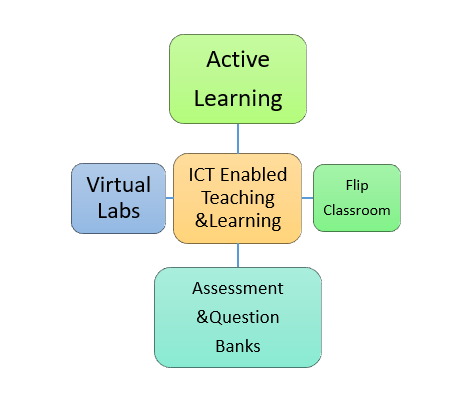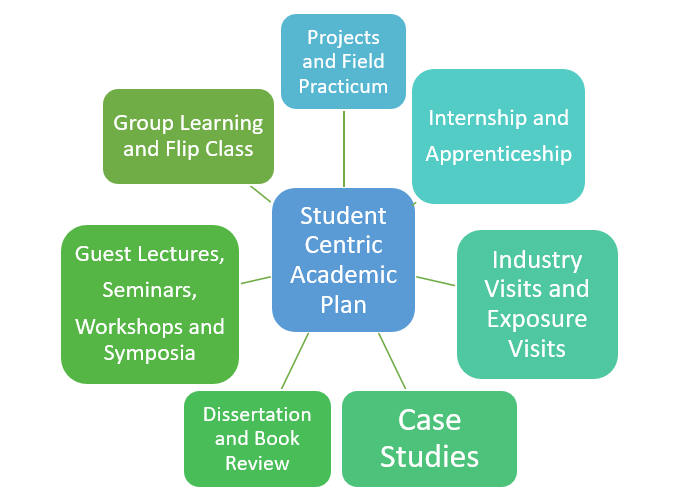Student centric methods used for enhancing learning experiences
2.3. Teaching-Learning Process
2.3.1. Student centric methods, such as experimental learning, participative learning and problem-solving methodologies are used for enhancing learning experiences
Response:
Centurion University since inception has focused on the overall development of the students by ensuring that the learning process becomes student centric. The University stresses on developing the hands-on learning skill among students by providing them the adequate facilities for collaborative action and then ensuring the enhancement of problem-solving skills through active involvement in real life projects. These methods are well blended into the University’s Curriculum. The following mentioned practices provide the broad spectrum of initiatives undertaken by the University to make the learning process student centric.
Projects and Field Practicum
This ensures that the projects are the built-in components of most of the courses. Besides this, minor and major projects are included in the programs. Students opting for domain courses gets involved in live projects for which the University has tied-up with various industries. For this purpose, Centurion University has collaborated with a number of scientific institutions and other Universities. Besides lab practical students learn to use various advanced tools like Biovia and Simulia for the purpose of simulation. Field experiments are an integral part of various courses.
Internship and Apprenticeship
Internships and apprenticeships are undertaken by the students in various organizations for which credits are assigned in the programs. Through internship and apprenticeship students get an opportunity to match their classroom knowledge with that of their on-the-job experience. Apprenticeship is provided in the domain courses to hone the skill of the students.
Industry Visits and Exposure visit
Various schools and departments arrange for their student’s industry visits and exposure visits to give an insight into the internal working environment of various companies. They get an exposure into the workings of various companies. They get an exposure into the various functions of an organization and the technologies used by them and thus broadening their sphere of knowledge. It also sensitizes them about the practical challenges faced by the organizations.
Guest Lectures, Seminars, Workshops and Symposia:
In order to ensure the academic development and to make aware the students of the current trends in the industry various schools organize guest lectures, seminars, workshops and symposia on new age topics. The students of different schools have formed various clubs. The purpose of such clubs are to conduct student seminar, developing wall magazines and newsletter on the contemporary and advance topics and thus enriching their learning experiences in the process.
Group learning and Flip the class pedagogy:
Learning methods involving group discussion, group assignment and brainstorming sessions are part of the curriculum design which ensures peer learning. Flip class pedagogy ensures that the students learning process is uniform and proper.
ICT Enabled teaching:
ICT enabled teaching includes Wi-Fi enabled classrooms with LCD and projectors, smart classrooms and language lab. E-Learning resources are available for students which can be assessed by them from anywhere and on anytime.
Case studies:
Case study method of teaching used by various department enhances the critical thinking and problem-solving ability among the students. It helps them to hone their communication and interpersonal skills. Through this methods student try to find solutions to the real problems faced by the organizations.
Dissertation and Book Review:
Dissertations included in the course curriculum by various schools under the active guidance of the faculty members and industry personnel and monitored by the departments promote the self-learning of the students. Similarly, Book-Review undertaken by the students helps them to gain deeper insight into a topic.
Events:
Various events like Idea generation forums, Entrepreneurial Boot Camps, product competition, marketing games conducted by the various schools of the University provide the students with practical knowledge and enhances their skill.
2.3.2. Teachers use and ICT enabled tools including online resources for effective teaching and learning process

Response:
The ICT enabled teaching learning eco-system at Centurion University plays an important role in imparting quality education. The embedment of ICT (Information and Communication Technology) tools in the teaching learning process is continuous and efficient.
The education management system at the Centurion University is created as a comprehensive teaching resource to connect with the thousands of students spread across all the campuses of Centurion University. Core functions like examinations, assessment and question bank are facilitated by Education Management system.
All the faculty and students have access to smart classrooms with multimedia aids which includes LCD projectors, smart TVs, high speed internet and audio system. The education management system of the University is designed to integrate the planning and execution of the semesters which include the various aspects like attendance, lesson plans, evaluation and mentoring etc. The media resource centre (MRC) of the University plays a crucial role in preparing digital contents and lecture videos for the various courses.
The digital library at the University provides University wide subscription of online resources to faculty and students that includes books, journals, databases and other learning materials. The Centurion courseware developed by the University has a collection of digitized contents for more than 900 courses from various disciplines. Moreover, the teaching method at the University includes virtual class room method of teaching which is done with the help of impartus which is a video learning software.
The language laboratory facilitates classroom engagement and interaction via computer based exercises and activities. Centurion University uses the teaching and learning resources from SWAYAM MOOCS platform. Another platform developed by the University is the Gooru platform which further facilitates the online teaching learning process. I calibrator developed by the University helps in conducting online assessments. The University also has access to the best of the software and simulation platforms offered by Dassault, which includes Catia, Simulia, Biovia, Enovia and Delmia. The VLab tool of the University provides access to faculties and students for conducting experiments.
The University wide subscription of software’s like Turnitin and Urkund ensures that the assignments, project and dissertations submitted by the students are thoroughly checked for plagiarism prior to the submission. Further Faculties use tools such as Adobe Spark and Doodly to create impactful and digitized contents for the courses.
